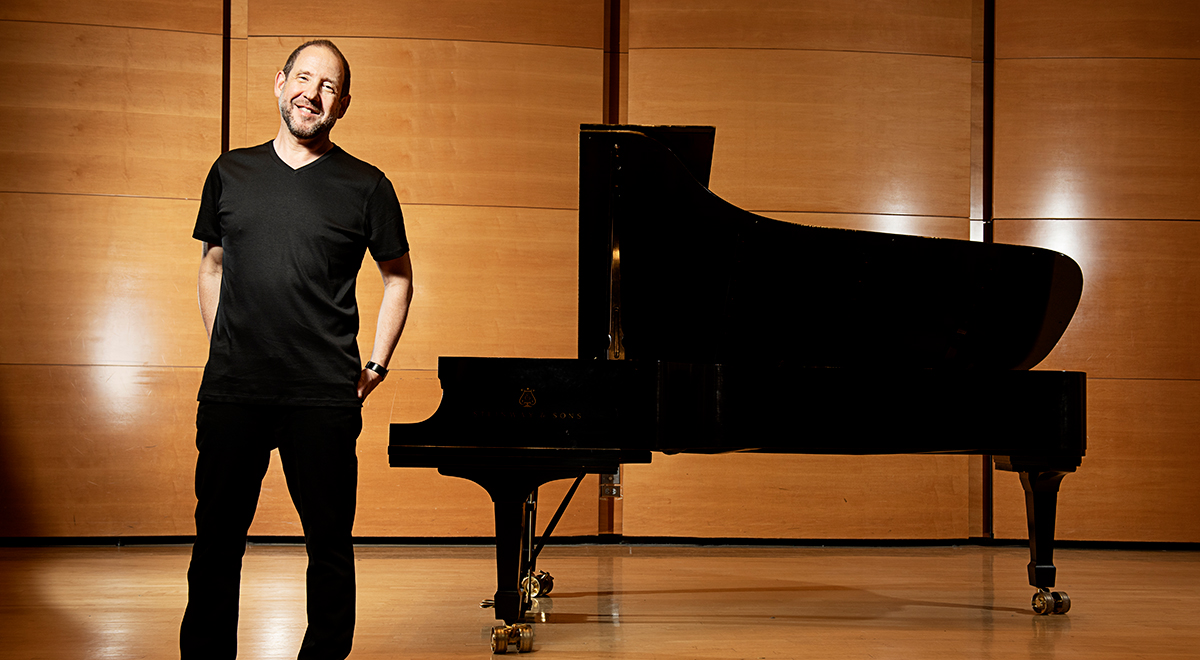Berman ’84 to premiere new work for piano at Wesleyan on April 5

Donald Berman ’84 tried not to be musician, but couldn’t help himself.
“I think that’s the only reason to do it,” Berman said of becoming a musician. “It’s because you can’t not do it.”
Berman studied Music at Wesleyan, and has gone on to work as a pianist, teacher, and scholar, adding over 200 commissioned musical works to the contemporary canon.
Nearly 40 years after he finished his undergraduate studies, Berman will return to campus on April 5 at 8 p.m. to perform a solo piano program. In the concert, Berman will pair two works by composer Charles Ives in celebration of the 150th anniversary of Ives’ birth with four newly-commissioned musical portraits of women who were pivotal figures in American Transcendentalism. The new portraits center women and reframe our understanding of Ives’ Piano Sonata No. 2, “Concord, Mass. 1840-60” (1915). Ives’ work is a monumental portrait of the Transcendentalists, and the new pieces provoke fascinating revelations and connections across periods and styles.
The new works were written by composers that Berman has known for over 30 years: Eve Beglarian, David Sanford, Marti Epstein, and Elena Ruehr. “I thought really carefully about this project,” he said of the idea, which he developed over the course of a decade.
The concert will feature the world premiere of Beglarian’s work “as syllable from sound,” the last of the four new pieces that Berman has commissioned and premiered since 2018. “I’m really looking forward to it,” Berman said.
Berman leads the course “The Soul Selects Her Own Society: Emily Dickinson, Charles Ives, and Free Thinking” at the Longy School of Music of Bard College, where he has taught since 2015, and is chair of Keyboard Studies. “Through that course, I realized what incredible connections there were between Dickinson and Ives,” said Berman, particularly how they created their art in solitude. Berman said that Dickinson had also admired Ralph Waldo Emerson. “Eve’s piece is a response to that,” Berman said.
Growing up in White Plains, New York, Berman started playing piano at age five, and listened to the record collection of his father, who had worked for the NBC Opera broadcasts as a business manager. When Berman arrived at Wesleyan in fall 1980, he wasn’t sure what he wanted to do. He took courses in the Science in Society Program, and in urban planning.
Berman studied piano at Wesleyan with George Barth ’72. “He had a way of questioning everything, and I was starting to see how classical music might be for me,” Berman said of Barth. Berman was the first winner of the Elizabeth Verveer Tishler Competition in 1982.
Berman also learned solkattu (spoken rhythm) with T. Ranganathan, and studied counterpoint and sang in the choir directed by Richard K. Winslow ’40, Hon ’10, P ’71, GP ’23. “I really loved my time there,” Berman said of his years in Middletown, which included accompanying Dance department classes.
Starting his junior year at Wesleyan, Berman began studies in New Haven with John Kirkpatrick, who had premiered the “Concord” Sonata by Ives in 1939 at Town Hall in New York. Kirkpatrick had retired from Yale University, and Berman was his only student for three years. With Kirkpatrick, Berman worked on Igor Stravinsky’s Concerto for Piano and Winds, which Berman performed with the Wesleyan University Orchestra. Berman went on to pursue graduate studies in Boston at the New England Conservatory of Music with Leonard Shure.
No longer a student and now the teacher, Berman has led Tufts University’s New Music Ensemble since 1997. “It’s really fun for me to exercise that kind of creativity,” Berman said of his work at Tufts, which draws on the avant-garde techniques he learned at Wesleyan from composer Alvin Lucier.
After graduate school, Berman decided if he was going to learn the “Concord” Sonata by Ives, which Berman called his “Mount Everest,” he would first learn 40 of Ives’ short pieces, which Berman proceeded to edit, perform, publish, and record. “I made the process a little strict, but it made it very interesting,” Berman said. “It was quite a challenge, but extremely rewarding.”
Berman will release his recording of the “Concord” Sonata and “Black March” produced by Adam Abeshouse for Avie Records on May 3.
Since 2016, Berman has also served as President and Treasurer of the Charles Ives Society, of which John Spencer Camp Professor of Music Neely Bruce is a member. “I’m just wired for polyrhythms and rhythmic games, and that’s what gravitated me toward Ives,” Berman said. “It’s labor of love,” Berman said of his work with the Ives Society.

